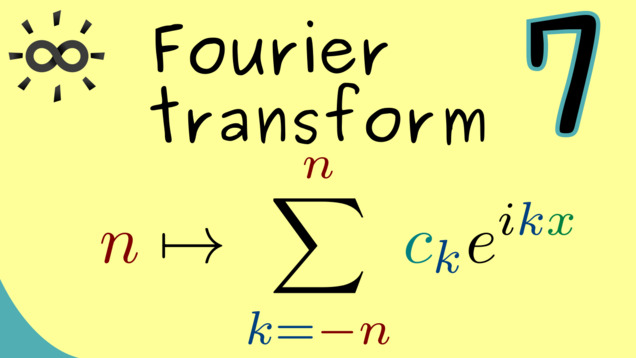
-
Title: Complex Fourier Series
-
Series: Fourier Transform
-
Chapter: Fourier Series
-
YouTube-Title: Fourier Transform 7 | Complex Fourier Series
-
Bright video: https://youtu.be/o0Pq5LbjSX8
-
Dark video: https://youtu.be/eK-yoB7mlzo
-
Ad-free video: Watch Vimeo video
-
Quiz: Test your knowledge
-
Dark-PDF: Download PDF version of the dark video
-
Print-PDF: Download printable PDF version
-
Thumbnail (bright): Download PNG
-
Thumbnail (dark): Download PNG
-
Subtitle on GitHub: ft07_sub_eng.srt missing
-
Timestamps (n/a)
-
Subtitle in English (n/a)
-
Quiz Content
Q1: Consider the function $f: \mathbb{R} \rightarrow \mathbb{C}$ given by $f(x) = 2 + \cos(2x)$ as a $2 \pi$-periodic function. What is the correct representation of $f$ using exponentional functions?
A1: $f(x) = 2 e^{i 0 x} + \frac{1}{2} e^{i 2x} + \frac{1}{2} e^{-i 2x}$
A2: $f(x) = 2 + \frac{1}{2} e^{ix} + \frac{1}{2} e^{-ix}$
A3: $f(x) = \frac{1}{2} e^{i 2x} + e^{-i 2x}$
A4: $f(x) = \frac{1}{2} (e^{i 2x} + e^{-i 2x})$
Q2: Consider the folling subspaces of the complex trigonometric polynomials $\mathcal{P}_{2\pi-per}(\mathbb{R}, \mathbb{C})$. What is correct?
A1: $$\mathrm{Span}\Big( x \mapsto 1, x \mapsto \sin(x), x \mapsto \cos(x) \Big)$$ $$= \mathrm{Span}\Big( x \mapsto e^{i 0 x}, x \mapsto e^{i x}, x \mapsto e^{- i x} \Big) $$
A2: $$\mathrm{Span}\Big( x \mapsto 1, x \mapsto \sin(x) \Big) $$ $$= \mathrm{Span}\Big( x \mapsto e^{i 0 x}, x \mapsto e^{i x}, x \mapsto e^{- i x} \Big) $$
A3: $$\mathrm{Span}\Big( x \mapsto 1, x \mapsto \cos(x) \Big) $$ $$= \mathrm{Span}\Big( x \mapsto e^{i 0 x}, x \mapsto e^{i x}, x \mapsto e^{- i x} \Big) $$
A4: $$\mathrm{Span}\Big( x \mapsto \sin(x) \Big) $$ $$ = \mathrm{Span}\Big( x \mapsto e^{i x}, x \mapsto e^{- i x} \Big) $$
Q3: Consider the function $f: (-\pi, \pi] \rightarrow \mathbb{R}$ given by $f(x) = x^2$ as a $2 \pi$-periodic function. What is not correct for the Fourier series and its coefficients $a_k$, $b_k$ for this case?
A1: $c_k = 0$ for $k$ even.
A2: $c_0 = \frac{\pi^2}{3}$.
A3: $\mathcal{F}_1(f)(x) = \frac{1}{3} \pi^2 - 2 e^{ix} - 2 e^{-ix} $
A4: $c_k = \frac{2}{k^2} (-1)^k$ for $k \neq 0$.
-
Last update: 2024-11